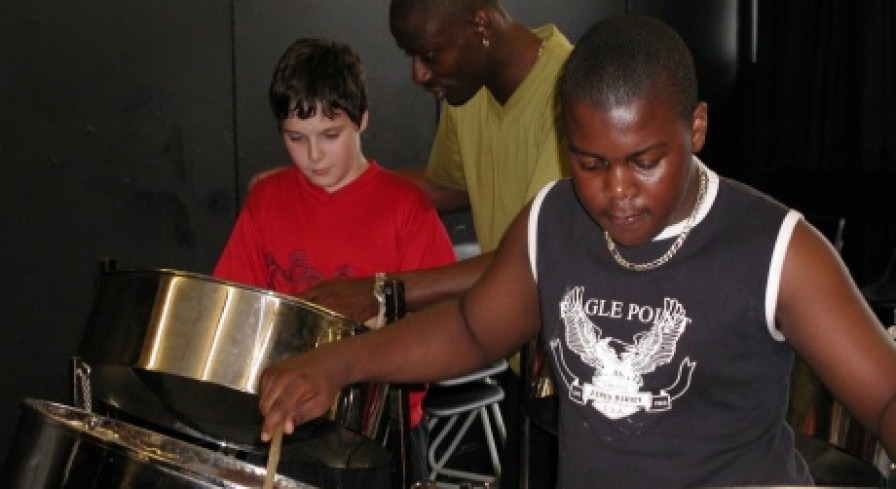Are we giving children the right chances?

The roadblock standing in the way of young people's musical progression is not just a lack of funds. Sometimes it’s the adults who are supposed to be helping them.
Music leaders can build or undermine confidence
When I was a teenager, I was determined to be a professional percussionist, very much inspired by seeing Buddy Rich at the new Theatre in Cardiff in 1982. Unfortunately, my percussion teacher a few years later took it on himself to make me feel that I wasn’t any good. My lessons with him were a profoundly negative experience.
Rather than let it get to me however, the experience drove me on even more and ultimately, I became a professional percussionist despite him and not because of him. However, I still wonder to this day how many young musicians who, if placed in a similar position to me, would believe what he’d said was true and quit? The approach, behaviour and influence of your teacher can be all-powerful, both positively and negatively.
Me in 1985, busking in Cardiff to raise money for the Band Aid campaign
Encourage children to embrace their talents
In 1999, I went on to set up Plymouth Music Zone (PMZ) to provide music making opportunities for young people in the area, particularly those who’d not previously had the opportunity. In setting up this new charity, there was great commitment from all involved to make it happen. Unfortunately though, I did observe some negative attitudes similar to those of my percussion teacher and realised that my musical experience from childhood was in fact, more common than I had first thought.
These negative attitudes were largely to do with low aspirations and opinions from people in authority regarding the children they were responsible for in school. A common reaction was that they felt the kids wouldn’t turn up – ‘”they’re deprived you know” was what I was told. This view sat alongside their low expectations of parents and their ability to support their children in taking part. Again, just like when I was a teenager, the result of this was to drive me on even more to prove them wrong.
I remember one PMZ participant in particular. She composed great songs, largely hip hop based using music technology. She attended PMZ weekly to do this. It transpired that her music wasn’t taken seriously by her Head of Music at school, largely because what she wrote and the genre she worked with was something he wasn’t experienced in. Rather than embrace it, he blocked and dismissed it so she came to PMZ instead where she was welcomed with open arms.
My own experience in music education over the years leads me to believe that every young person has the capacity to do something remarkable, they just need to be given the opportunity, support and inspiring environment every step of the way. If young people are written off at an early age by the professionals who serve them, how on earth are they going to progress?
Don't be afraid to challenge young people
Sometimes though, even with the best intentions we can take things to the other extreme.
I’ve previously been involved in a variety of progression projects, particularly working alongside professional orchestras. One such project springs to mind working with the Orchestra of the Age of Enlightenment (OAE), a world class baroque orchestra. The project was for young musicians who were doing well musically but who wanted to be taken to the next stage in terms of understanding other styles of music, the work of a professional orchestra and developing their skills.
The OAE team worked the musicians very hard during the residency and the outcomes achieved were astonishing. Interestingly though, some of the other staff involved perceived that the young musicians were being pushed too hard, the implication being that they needed to be treated with kid gloves due to their challenging circumstances. Like any other pastime, you get out what you put in and isn’t it human nature to want to get even better at something you’re good at? My view is that if we’re serious about progressing young people’s music making we need to provide a supportive yet positively challenging environment when they can fully reach their potential.
Great music leadership breaks down boundaries
It can be easy for us to make assumptions about what young people are capable of. Sometimes it can be easy dismiss young people outright and write off their abilities. Equally we can underestimate what they can achieve despite their circumstances. Either way, when we have low expectations we fail to stretch young people musically to enable them to achieve great things. Confident, collaborative and enabling leadership is needed from everyone working in music education. If we get this right, ‘access’ and ‘excellence’ are part of the same equation, ‘informal’ and ‘formal’ learning become part of the same thing and any sense of ‘musical hierarchy’ is removed.
The roadblocks that stand in the way of young people’s progression come in all shapes and sizes. The question is, are we currently one of them?

